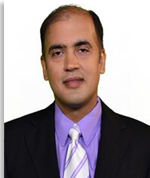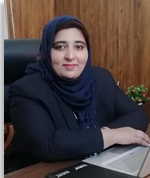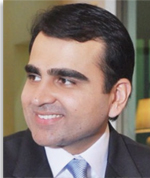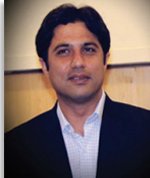Last Three Year Articles
Year:
2019
1-
Prof. Dr. Mumtaz Anwar Ch., Amar Razzaq et al,; Can the informal groundwater markets improve water use efficiency and equity? Evidence from a semi-arid region of Pakistan, Science of the Total Environment, Vol 666, pp. 849-857, 2019
2-
Prof. Dr. Mumtaz Anwar Ch., Muhammad Asad ur Rehman Naseer et al,; Critical issues at the upstream level in sustainable supply chain management of agri-food industries: Evidence from Pakistan’s citrus industry, Sustainability, Vol. 11, pp. 1326, 2019
3-
Prof. Dr. Mumtaz Anwar Ch., Uzooba Hureem et al,; Estimate the Economic Cost of Achieving WASH related SDGs Targets in Punjab, Journal of Sustainable Finance and Investment, pp. 1-17, 2019
4-
Prof. Dr. Abdul Salam,; Distortions In Producer Incentives of Cash Crops in Pakistan, Pakistan Economic and Social Review, Vol 57, No. 2 pp. 143-161, 2019
5-
Dr. Kalsoom Zulfiqar and Durdana Qaiser Gillani,; Socio-Economic Disparities and an Imperative for Inclusive Economic Growth in Pakistan, Journal of Research Society of Pakistan, Vol.56, Issue No.1 pp. 73-84, 2019
6-
Dr. Muhammad Azmat Hayat, Muhammad Yasar Sattar and Humaira Beenish,; Determinants of Self-Employment A Survey Analysis of the Province of the Punjab, Pakistan Business Review, Volume 21(1) pp.98-111, 2019
7-
Dr. Muhammad Azmat Hayat, Muhammad Jamil Shah and Tahir Mehmood,; Governance, Economic Growth and Socioeconomic Development in Pakistan, European Online Journal of Natural and Social Sciences, Vol 8, No 4(s) pp.20-36, 2019
Year:
2018
1-
Dr. Kalsoom Zulfiqar, Muhammad Nadeem and Zahid Pervaiz,; An Empirical Analysis of Globalization, Diversity and Social Cohesion, Journal of Political Studies, Vol. 25 No. 1 pp. 181-198, 2018
2-
Dr. Kalsoom Zulfiqar and Qurat ul Ain,; An Analysis of Income Convergence across Asian Countries, Forman Journal of Economic Studies, Vol. 14 pp. 125-141, 2018
3-
Dr. Kalsoom Zulfiqar,; Fiscal Policy for Inclusive Growth: A case Study of Pakistan, Pakistan Economic and Social Review, Vol. 56, No. 1. pp. 17-42, 2018
4-
Dr. Kalsoom Zulfiqar and Durdana Qaiser Gillani,; An Empirical Analysis of Male Labour Force Participation in District Lahore, Pakistan Perspectives, Vol.23. pp.95-107, 2018
5-
Dr. Kalsoom Zulfiqar and Amjad Ali,; An Assessment of Association between Natural Resources Agglomeration and Unemployment in Pakistan, Journal of Pakistan Vision, Vol. 19 No.1 pp. 110-126, 2018
6-
Dr. Muhammad Azmat Hayat, Azhar Ali Janjua and Muhammad Aslam,; How Does Lending from Commercial Banks Impact Performance of Small Enterprises: A Case Study of District Hafizabad, Journal of Economic and Social Studies, Volume 8 (1), 2018
7-
Dr. Atif Khan Jadoon, Ambreen Sarwar and Aamir Azeem,; Education, Employment and Economic Growth Nexus: A case study of Pakistan, Journal of Independent Studies and Research, Volume 15 pp 15-30, 2018
8-
Dr. Atif Khan Jadoon, Aamir Azeem and Bilal Aziz,; Better tool for economic growth? Banks or secondary markets; Empirical evidence from selected ASIAN countries, Paradigms: A Research Journal of Commerce, Economics, and Social Sciences, Volume 11 pp 41-47, 2018
Year:
2017
1-
Prof. Dr. Mumtaz Anwar Ch. and Hafiz Ghulam Mujaddad,; Sufficiency Analysis of Local Production Capacity in Punjab for the Requirement of CPEC, Pakistan Development Review, Special Edition pp. 493-510, 2017
2-
Prof. Dr. Abdul Salam,; Prices of Food grains and Farm Inputs in Pakistan: Empirical Analysis of Farmers; Incentives and Terms of Trade; 1995-2015, Pakistan Economic and Social Review, Vol 55, No. 2 pp. 435-472, 2017
3-
Dr. Kalsoom Zulfiqar, Muhammad Aslam Chaudhry and Aribah Aslam,; Convergence Hypothesis: A cross country Analysis, Pakistan Economic and Social Review, Vol. 55 No.1 pp. 297-325, 2017
4-
Dr. Kalsoom Zulfiqar and Rukhsana Kausar,; Exchange rate volatility and productivity growth nexus in selected Asian countries, Pakistan Economic and Social Review, Vol. 55, No. 2. pp. 567-584, 2017
5-
Muhammad Azmat Hayat, and Muhammad Atiq Ur Rehman,; Capital Account Liberalization and Economic Growth: Evidence from Emerging Market Economies, Pakistan Economic and Social Review, Volume 55 No. 1 pp 271-285, 2017
6-
Muhammad Azmat Hayat, and Allah Ditta,; Macroeconomic Instability and its Role on Income Inequality in Developing Countries: A Panel Data Analysis, Pakistan Economic and Social Review, Volume 55 No. 2 pp 613-636, 2017
7-
Muhammad Azmat Hayat, Mansoor Mushtaq et al,; Distributional Impacts of Foreign Remittances in Pakistan, Pakistan Business Review, Volume 19(2) pp 320-338, 2017
8-
Dr. Atif Khan Jadoon, Ambreen Sarwar and Aamir Azeem,; Education, Employment and Economic Growth Nexus: A case study of Pakistan, Journal of Independent Studies and Research, Volume 15 pp 15-30, 2017
9-
Dr. Atif Khan Jadoon, Aamir Azeem and Bilal Aziz,; Better tool for economic growth? Banks or secondary markets; Empirical evidence from selected ASIAN countries, Paradigms: A Research Journal of Commerce, Economics, and Social Sciences, Volume 11 pp 41-47, 2017
10-
Dr. Maria Faiq Javaid,; Expenditure Efficiency and Fiscal Size: an empirical evidence from developing Asian countries, Pakistan Economic and Social Review, Volume 55 pp 247-269, 2017
Last Three Year Books
Year:
2019
1-
Prof. Dr. Abdul Salam,; Title: Consequences of Varying Exchange Rates for Agriculture in Punjab-Pakistan Publisher: Economic Challenges Facing Pakistan in a Changing Regional and Global Environment, published by the Lahore School of Economics, Year: 2019




















